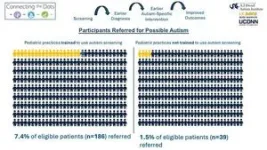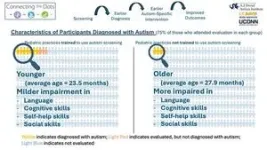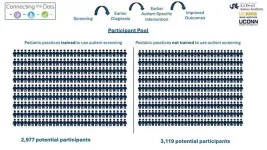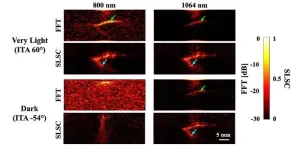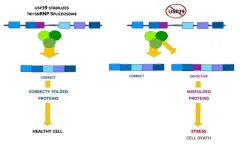(Press-News.org) The Medical University of South Carolina has been awarded $1.75 million from the Health Resources and Services Administration to develop and test the effectiveness and sustainability of the SC Rural Telehealth-enabled Collaborative Care Network (SC-RTECC). The SC-RTECC will deliver psychiatric collaborative care management to 1500 primary care patients over a five-year period in seven diverse, rural, underserved South Carolina counties.
The goal of the project is to test whether telehealth can be used to deliver psychiatric collaborative care management efficiently and sustainably at rural primary care clinics in South Carolina.
The project will be led by Ryan Kruis, Ph.D., director of grants and research at the MUSC Center for Telehealth, one of two HRSA-designated Telehealth Centers of Excellence. The Center will partner with 9 primary care sites in Bamberg, Calhoun, Orangeburg and Williamsburg Counties that are part of MUSC Health’s Regional Health Network, and 10 primary care clinics affiliated with Beaufort Jasper Hampton Comprehensive Health Services, a federally qualified health center (FQHC).
“The MUSC Center for Telehealth is very committed to supporting primary care at large in this state — not just among our own sites, but also at FQHCs and rural health clinics,” said Kruis. “I'm really excited about this opportunity to have the funded ability to really get the model right so that everyone benefits.”
Also excited about the study is Vanessa Diaz, M.D., chief of the Integrated Center of Clinical Excellence for Primary Care at MUSC Health.
“We need to find better ways to address the behavioral health needs of our primary care patients if we want to improve health outcomes significantly,” she said. “The collaborative care model funded by this grant is an innovative way to address behavioral health needs in a way that is convenient to patients and easy to implement in primary care practices.”
Jamie Hunter, M.D., chief medical officer/chief clinical officer at Beaufort Jasper Hampton Comprehensive Health Services, looks forward to leveraging telehealth resources to begin to move the needle on mental health care access.
“We at BJHCHS are excited to work with MUSC to provide telehealth access to mental health care for our patients,” said Hunter. “We have counselors on staff but no psychiatrists, so this will be a great resource as our patients will have access to psychiatric care without having to travel a far distance.”
The mental health crisis in rural America
The U.S. is experiencing a mental health crisis, with rural communities hit hardest.
“There has been a heightened focus on behavioral health since COVID,” said Kruis.
“We've seen upticks in substance use, depression and anxiety among youth and adults.”
According to Mental Health America, almost 1 in 4 U.S. adults, or 60 million Americans, have experienced a mental illness in the past year. During that time, 1 in 5 youth had at least one major depressive disorder, and more than half of those did not receive treatment. More than three-quarters of U.S. adults with substance use disorders also did not receive treatment.
It is estimated that there are 340 people for every mental health provider, with lack of access to mental health care most acute in rural communities. More than 122 million Americans live in mental health professional shortage areas, including South Carolinians in 43 of the state’s 46 counties. In these areas, only about a quarter of mental health care needs are being met.
In the two primary care networks participating in the SC-RTECC, patients requiring mental health services often wait 3 to 6 months for a psychiatric appointment, leaving the busy primary care physician to try to fill the gap.
A care model that works
The psychiatric collaborative care model is intended to improve behavioral health outcomes while taking some of the pressure off primary care physicians. In this model, physicians rely on behavioral health care managers, each with a case load of 60 to 80 patients. Care managers work closely with primary care physicians, who prescribe any medications, and consult with psychiatrists regularly to discuss cases and decide when to refer for a higher level of care.
This care model has been shown to improve mental health outcomes in more than 90 clinical trials. However, it is resource-intensive, making it difficult to implement, especially in rural clinics far from the urban centers where psychiatric expertise is usually concentrated.
Streamlining the model via telehealth
The HRSA-funded SC-RTECC will leverage telehealth to use behavioral health resources more efficiently and to support the long-range sustainability of this model of care. It will also support a better understanding of how this model can be delivered effectively among racially diverse rural communities.
SC-RTECC will hire two behavioral health care managers, one for each of the partnering primary care networks, as well as rely on behavioral care managers already in place at the MUSC Center of Telehealth. One new care manager will be stationed at the largest participating primary care clinic in each of the two primary care networks. There, each will provide virtual behavioral health care to patients at all participating clinics in the respective network and offer in-person visits as necessary. Care managers will meet weekly with MUSC Health psychiatrists to discuss cases and decide when referral to a higher level of care is required.
The goal of the project is to find out if a telehealth-adapted collaborative care model can improve behavioral outcomes in rural communities and do so in a sustainable way even after grant funding ends. New South Carolina Medicaid billing codes have been released recently, and the care model is being developed to comply with Medicare and Medicaid reimbursement requirements for behavioral care.
“It's really exciting that SC Medicaid has opened up the billing and that we will be able to optimize the model and then grow the program because we have revenue sources that can support it long term,” said Kruis.
MUSC is one of 27 sites awarded HRSA funding to explore leveraging telehealth to improve behavioral care. All sites will report their data to the Rural Health Research Center at the University of Iowa for evaluation, with a view to implementation nationwide.
###
About MUSC
Founded in 1824 in Charleston, MUSC is the state’s only comprehensive academic health system, with a unique mission to preserve and optimize human life in South Carolina through education, research and patient care. Each year, MUSC educates more than 3,200 students in six colleges – Dental Medicine, Graduate Studies, Health Professions, Medicine, Nursing and Pharmacy – and trains more than 900 residents and fellows in its health system. MUSC brought in more than $358.9 million in research funds in fiscal year 2024, leading the state overall in research funding. MUSC also leads the state in federal and National Institutes of Health funding. For information on academic programs, visit musc.edu.
As the health care system of the Medical University of South Carolina, MUSC Health is dedicated to delivering the highest-quality and safest patient care while educating and training generations of outstanding health care providers and leaders to serve the people of South Carolina and beyond. Patient care is provided at 16 hospitals (includes owned or governing interest), with approximately 2,700 beds and five additional hospital locations in development, more than 350 telehealth sites and nearly 750 care locations situated in all regions of South Carolina. In 2024, for the 10th consecutive year, U.S. News & World Report named MUSC Health University Medical Center in Charleston the No. 1 hospital in South Carolina. To learn more about clinical patient services, visit muschealth.org.
MUSC has a total enterprise annual operating budget of approximately $7.1 billion. The 31,000 MUSC family members include world-class faculty, physicians, specialty providers, scientists, students, contract employees, affiliates and care team members who deliver groundbreaking education, research and patient care.
END
Addressing the rural mental health crisis via telehealth
The Medical University of South Carolina receives one of 27 HRSA grants nationwide that seek to leverage telehealth to improve behavioral health in rural communities.
2024-11-14
ELSE PRESS RELEASES FROM THIS DATE:
Standardized autism screening during pediatric well visits identified more, younger children with high likelihood for autism diagnosis
2024-11-14
New research from Drexel University’s A.J. Drexel Autism Institute found that the use of standardized autism screening during pediatric well-child visits identifies more children with high autism likelihood at a younger age, including those presenting with more subtle symptoms. This is the first large-scale, randomized trial to test the impact of standardized autism screening on early detection of autism in pediatric primary care.
Recently published in the Journal of the American Academy of Child & Adolescent Psychology, the multi-site ...
Researchers shed light on skin tone bias in breast cancer imaging
2024-11-14
Breast cancer is a major health concern worldwide, and early detection is crucial for effective treatment. Traditional imaging methods, such as mammography, have limitations, especially for women with dense breast tissue. Photoacoustic imaging, which combines light and sound to create detailed images of breast tissue, offers a promising alternative. However, recent research has highlighted a significant challenge: skin tone bias.
A team of researchers from Johns Hopkins University recently investigated how skin tone affects the visibility of breast cancer targets in photoacoustic imaging. As reported in Biophotonics Discovery, the study focused on three image ...
Study finds humidity diminishes daytime cooling gains in urban green spaces
2024-11-14
Urban green spaces provide shade for city dwellers facing rising temperatures brought on by climate change, but how much relief from the heat island effect do they provide when humidity is factored in?
The temperature and humidity effect cancel each other out during daylight hours, but green spaces provide a net reduction in humid heat at night, according to a new study in Nature Cities, co-authored by Yale School of the Environment doctoral student Yichen Yang and Xuhui Lee, Sara Shallenberger Brown Professor of Climate Science.
"When it comes to urban ...
Tennessee RiverLine secures $500,000 Appalachian Regional Commission Grant for river experience planning and design standards
2024-11-14
The Tennessee RiverLine, an initiative of University of Tennessee Extension, has been awarded a $500,000 Area Development grant from the Appalachian Regional Commission (ARC) and Tennessee Department of Economic and Community Development to support the development of comprehensive Planning and Design Standards. These standards will help accelerate the creation of new river experience amenities along the 652-mile stretch of the Tennessee River, benefitting residents and visitors throughout the region.
The 18-month project will be led by a professional ...
AI tool ‘sees’ cancer gene signatures in biopsy images
2024-11-14
To determine the type and severity of a cancer, pathologists typically analyze thin slices of a tumor biopsy under a microscope. But to figure out what genomic changes are driving the tumor’s growth — information that can guide how it is treated — scientists must perform genetic sequencing of the RNA isolated from the tumor, a process that can take weeks and costs thousands of dollars.
Now, Stanford Medicine researchers have developed an artificial intelligence-powered computational program that can predict the activity of thousands of genes within tumor cells based only on standard microscopy images of the biopsy. The tool, described online in Nature Communications Nov. 14, ...
Answer ALS releases world's largest ALS patient-based iPSC and bio data repository
2024-11-14
Answer ALS Releases World's Largest ALS Patient-Based iPSC and Bio Data Repository
Unprecedented resource, created with Cedars-Sinai, to accelerate ALS research and drive development of targeted therapies globally
NEW ORLEANS, [November 14, 2024] — In a landmark continuing collaboration, Answer ALS and Cedars-Sinai have announced the completed availability of the largest amyotrophic lateral sclerosis (ALS) patient-based induced pluripotent stem cell (iPSC) and bio data repository. The repository encompasses biological and clinical data from nearly 1,000 ALS patients, offering an unprecedented resource for global ...
2024 Joseph A. Johnson Award Goes to Johns Hopkins University Assistant Professor Danielle Speller
2024-11-14
WASHINGTON, Nov. 14, 2024 – AIP and the National Society of Black Physicists congratulate Danielle Speller as the winner of the 2024 Joseph A. Johnson Award for Excellence. Jessica Esquivel is also being recognized with an Honorable Mention.
The Johnson Award, now in its fifth year, is given jointly by AIP and NSBP to recognize early-career scientists who demonstrate scientific ingenuity and impactful mentorship and service—the core values of NSBP founder Joseph A. Johnson.
“Dr. Speller not only ...
Slow editing of protein blueprints leads to cell death
2024-11-14
FRANKFURT. Genes contain the essential building instructions for life, guiding cells on which amino acids to assemble in what sequence to produce specific proteins. The human genome codes for about 20,000 such instructions. “Nevertheless, our cells can produce several hundred thousand different proteins,” explains Prof. Ivan Đikić from the Institute of Biochemistry II at Goethe University Frankfurt.
This diversity is enabled by a process known as “splicing.” When a cell requires a protein, it generates a copy of the relevant instructions in the cell nucleus. During splicing, this transcript undergoes modification: a cellular editing complex, the spliceosome, ...
Industrial air pollution triggers ice formation in clouds, reducing cloud cover and boosting snowfall
2024-11-14
Pollution from industrial hotspots can trigger ice formation in supercooled clouds, altering their reflective properties and increasing regional snowfall, according to a new study. The findings shed light on poorly understood impacts of anthropogenic aerosols on climate and could help improve climate modeling and mitigation strategies. The impact of human-generated aerosols (tiny air pollution particles) on climate, particularly in counteracting greenhouse gas-induced warming, remains uncertain. These aerosols, in addition to influencing cloud formation as cloud condensation nuclei (CCN), may also act as ice-nucleating particles (INPs), crucial for ice formation in supercooled ...
Emerging alternatives to reduce animal testing show promise
2024-11-14
In a Policy Forum, Chad Nelson and colleagues highlight the efforts of the U.S. Food and Drug Administration (FDA) in advancing alternative methods to reduce animal testing for regulatory use. Animal studies have been crucial for advancing disease understanding, developing therapies, and assessing the safety and effectiveness of consumer products. However, reducing animal use and developing effective alternatives is an ongoing priority. Although advances in biology, engineering, and artificial intelligence offer new opportunities to improve product safety assessments, these technologies require extensive development to meet regulatory ...
LAST 30 PRESS RELEASES:
Korea University, Stanford University, and IESGA launch Water Sustainability Index to combat ESG greenwashing
Molecular glue discovery: large scale instead of lucky strike
Insulin resistance predictor highlights cancer connection
Explaining next-generation solar cells
Slippery ions create a smoother path to blue energy
Magnetic resonance imaging opens the door to better treatments for underdiagnosed atypical Parkinsonisms
National poll finds gaps in community preparedness for teen cardiac emergencies
One strategy to block both drug-resistant bacteria and influenza: new broad-spectrum infection prevention approach validated
Survey: 3 in 4 skip physical therapy homework, stunting progress
College students who spend hours on social media are more likely to be lonely – national US study
Evidence behind intermittent fasting for weight loss fails to match hype
How AI tools like DeepSeek are transforming emotional and mental health care of Chinese youth
Study finds link between sugary drinks and anxiety in young people
Scientists show how to predict world’s deadly scorpion hotspots
ASU researchers to lead AAAS panel on water insecurity in the United States
ASU professor Anne Stone to present at AAAS Conference in Phoenix on ancient origins of modern disease
Proposals for exploring viruses and skin as the next experimental quantum frontiers share US$30,000 science award
ASU researchers showcase scalable tech solutions for older adults living alone with cognitive decline at AAAS 2026
Scientists identify smooth regional trends in fruit fly survival strategies
Antipathy toward snakes? Your parents likely talked you into that at an early age
Sylvester Cancer Tip Sheet for Feb. 2026
Online exposure to medical misinformation concentrated among older adults
Telehealth improves access to genetic services for adult survivors of childhood cancers
Outdated mortality benchmarks risk missing early signs of famine and delay recognizing mass starvation
Newly discovered bacterium converts carbon dioxide into chemicals using electricity
Flipping and reversing mini-proteins could improve disease treatment
Scientists reveal major hidden source of atmospheric nitrogen pollution in fragile lake basin
Biochar emerges as a powerful tool for soil carbon neutrality and climate mitigation
Tiny cell messengers show big promise for safer protein and gene delivery
AMS releases statement regarding the decision to rescind EPA’s 2009 Endangerment Finding
[Press-News.org] Addressing the rural mental health crisis via telehealthThe Medical University of South Carolina receives one of 27 HRSA grants nationwide that seek to leverage telehealth to improve behavioral health in rural communities.

